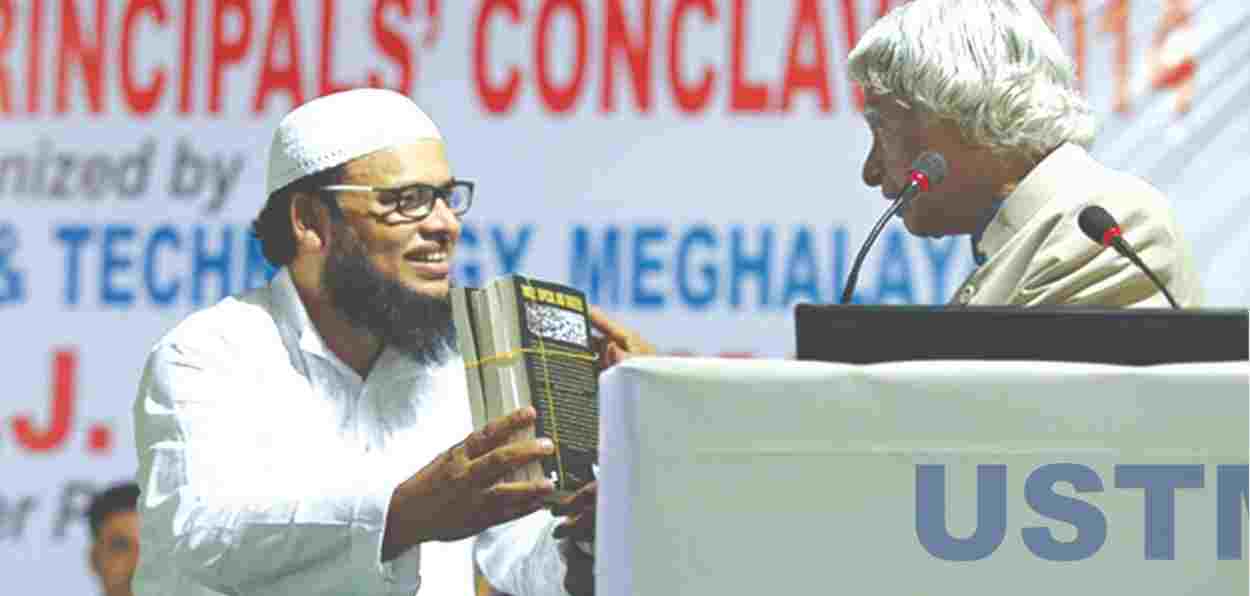
Rita Farhat Mukand
Today’s education is a big business, notoriously expensive for the middle and underprivileged sections of society and most Indian parents are struggling with the paraphernalia of trying to get children through school and college. However, in this situation it's the people like Mahbubul Hoque who have become saviours to ensure nobody misses education because of poverty.
Chancellor Mahbubul Hoque is the founder of many institutions including the University of Science and Technology Meghalaya and chairman of the Education Research and Development Foundation in Guwahati.
Donning a skullcap, and wearing a flowing beard, Mahbubul comes across as a humble, cultured, and courteous person. A simple interaction with him revealed the depth of his patience, humility, and kindness.

The campus of University of Science and Technology Meghalaya
Twenty years down the road, his achievements are fascinatingly groundbreaking. One of his striking statements lost in a materialistic world is, “There is no point in living a luxurious life and showing off. Life and wealth are from the Almighty for doing good deeds and to serve the society for which we are answerable on the Day of Judgement.”
The inspirational story of Mahbubul Hoque unfolds to reveal a very sensitive soul with a tremendous vision to empower the children and youth of North East with excellent affordable education the road to achieving this was not easy but he kept changing his shoes and aspiring higher.
Mahbubul Hoque was born in a remote village called Purbogool in Patharkandi, Karimganj district of Assam, into a poor home. Tragedy struck when he was in the seventh standard and his father, a Panchayat Secretary, passed away. His world seemed to fall apart again when he was in the 12th standard, his mother left this world and his elder brother was his solace and comfort.
“Those were nightmarish times,” Hoque says, “But I never gave up. Initially, I sold home-grown vegetables in the local market and later also gave tuition to schoolchildren to finance my education.”
Qoumrul Hoque stood by his younger brother like a solid rock and helped to finance his education. Mahbubul Hoque’s academic excellence lent him wings to fly through his studies, completing his matriculation in Karimganj and excelling in his Intermediate (Science) at G.C. College, Silchar.
At the Aligarh Muslim University, he immersed himself In his studies from 1993 to 2000 earning a first-class distinction in BSc (Chemistry) and achieving the second-highest rank in PGDCA & MCA (masters in Computer Sciences).
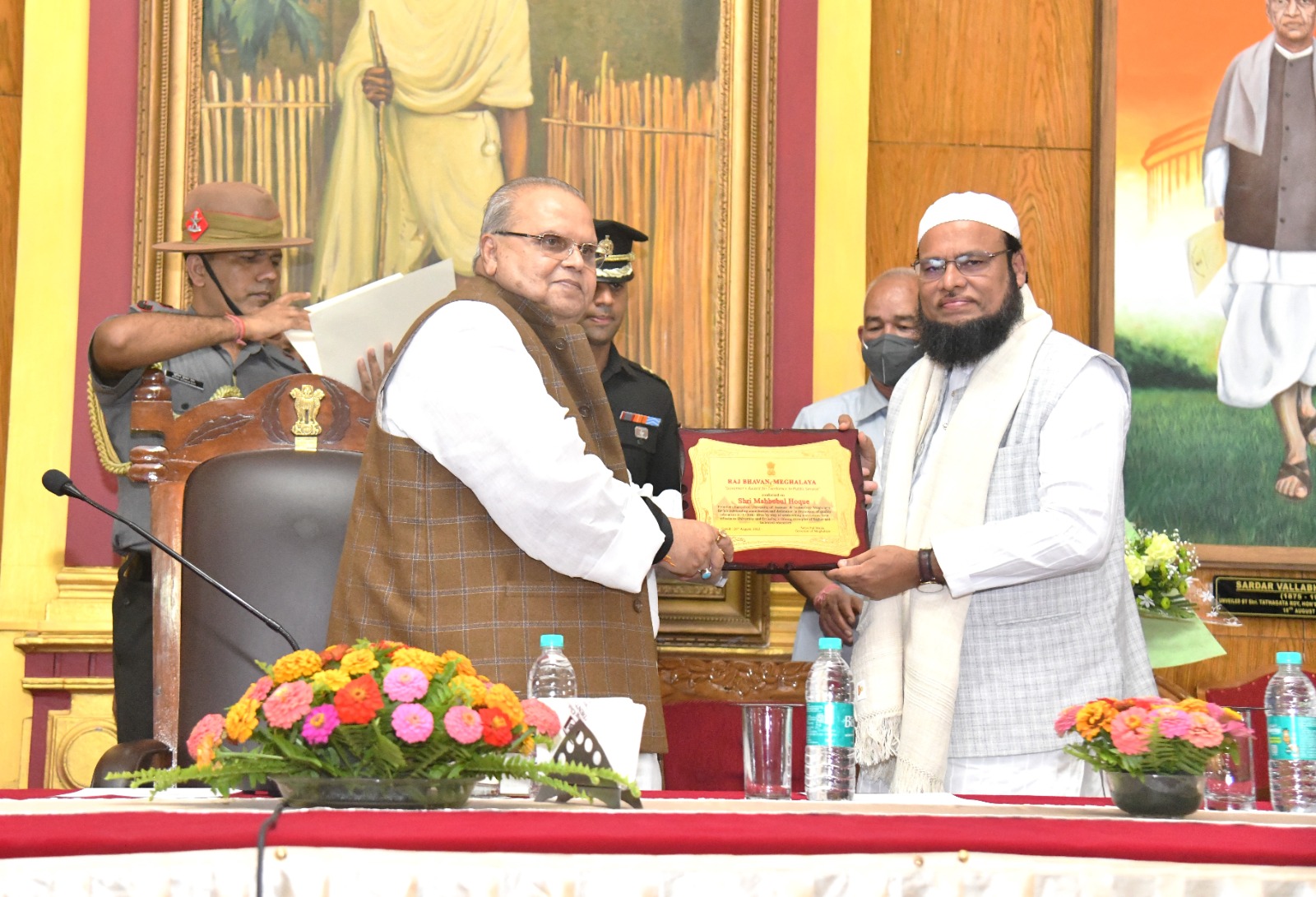 Governor Satyapal Malik conferring an award on Chancellor Mahbubul Hoque
Governor Satyapal Malik conferring an award on Chancellor Mahbubul HoqueWhile in Aligarh, Hoque lost his elder brother in a road accident. His brother had been supporting his education, and with this unexpected loss, he found himself in a difficult situation. He was now funding his studies through tuition classes.
During his student days at AMU, Mahbubul Hoque came across as a contemplative individual and whenever he was free from his studies, would run to his favourite secret spot at the tomb of Sir Sayed Ahmed as a gesture of reverence to the visionary founder of the renowned university and would return feeling refreshed. He never realized that one day he would be hailed as the "Sir Syed of North East" for his pioneering efforts in advancing modern education in the region.
After graduating from AMU, he turned down several job offers from both Indian and international multinational companies and chose to follow his dream - to return to Guwahati and contribute to society by advancing his education.
Hoque decided to become an enterpreneur. During that period, the demand for Computer Science courses was on the rise. Given his proficiency with computers, he envisioned starting a private IT startup in collaboration with others. However, he faced tepid responses from the community and a prominent businessman and community leader, who currently leads a political party tried to talk him out of saying that his appearance with his traditional kurta-pyjama and skullcap would be a big setback for him.
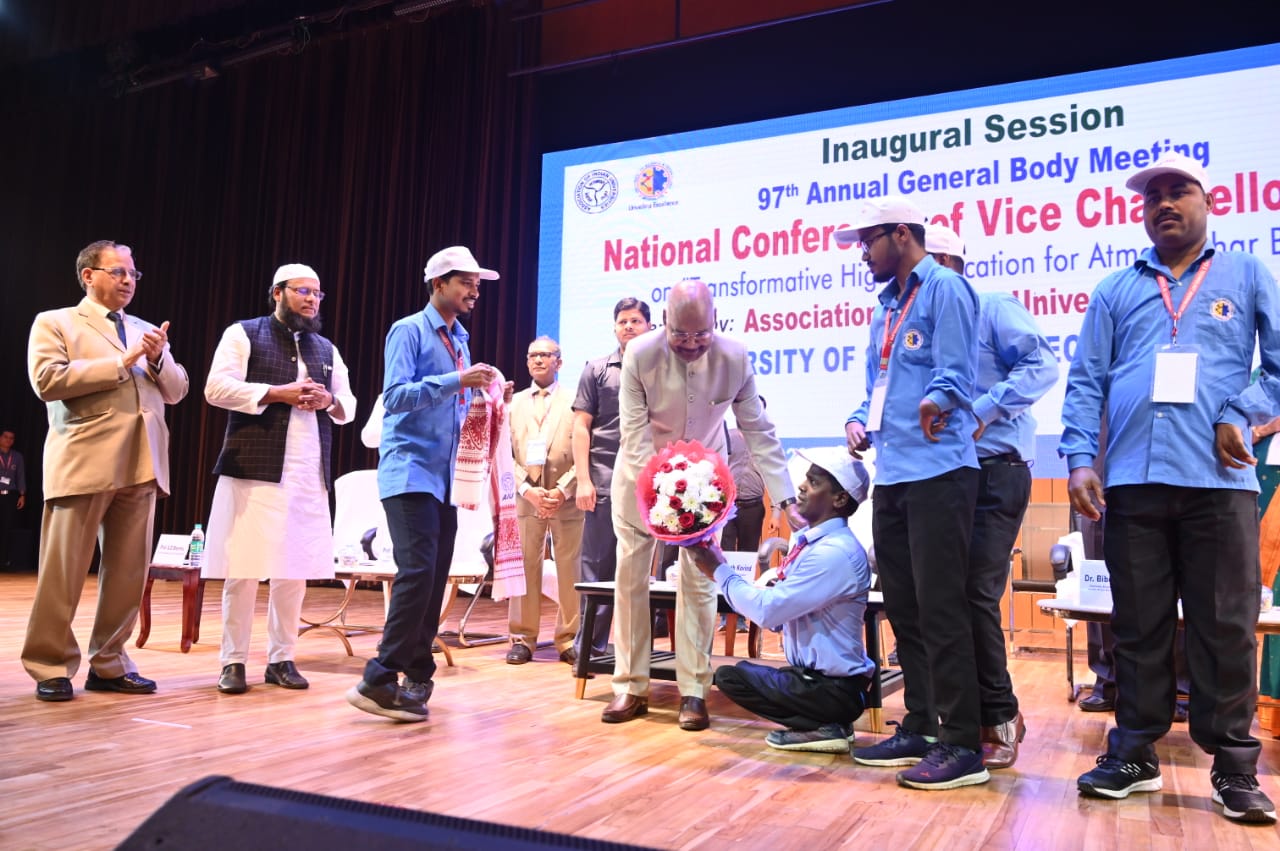 Award distribution ceremony at the University
Award distribution ceremony at the University
Strong as steel, Hoque undeterred by rejection decided to embark on his venture independently.
In 2001, armed with a modest sum of Rs 84, four IGNOU-enrolled students, and his old computer from Aligarh, he launched his endeavour. The modest beginnings unfolded in a rented room in the Ganeshguri area of Guwahati. He lived within the institution and slept on the office sofa. Even building owners were initially hesitant to provide him with accommodation.
He began assembling computers and successfully sold 100 units. With the proceeds, he established a 5-computer lab in Guwahati and secured the franchise of Sikkim Manipal University (SMU), a prestigious private university offering distance education across India. “The affiliation fee for a Manipal study center was Rs 2 lakh, which I didn’t have at that time,”
Hoque recollects, “A gentleman at Manipal, after knowing my Aligarh background and my merit agreed to grant me the affiliation keeping the fee payment pending, which I later cleared in instalments of Rs 25,000 after borrowing from a friend.”
Finally, fortune began to smile on Hoque. The study center, which initially enrolled just 26 students in its inaugural batch, burgeoned to 35,000 by 2006, earning the distinction of being the second-largest SMU center in India.
"With pride," Hoque narrates, "we were honoured with five consecutive Excellence Awards, presented by India's renowned bowler Anil Kumble, who served as the Brand Ambassador of Sikkim Manipal University during those years."
He founded the University of Science and Technology Meghalaya (USTM), the first private university in the Northeast region and by far the best of all his ventures.
“There is no dearth of talent in the North East. The students here are smart and proficient in English because English is the medium of instruction in the whole region except Tripura and Assam,” says Hoque. He acknowledges that the longstanding issue in the region has been the scarcity of higher education institutions. However, over the last two decades, positive changes have occurred. Through tireless efforts, quality institutions have emerged, not only enhancing the overall educational landscape but also curbing the migration of students to other parts of India in search of quality education.
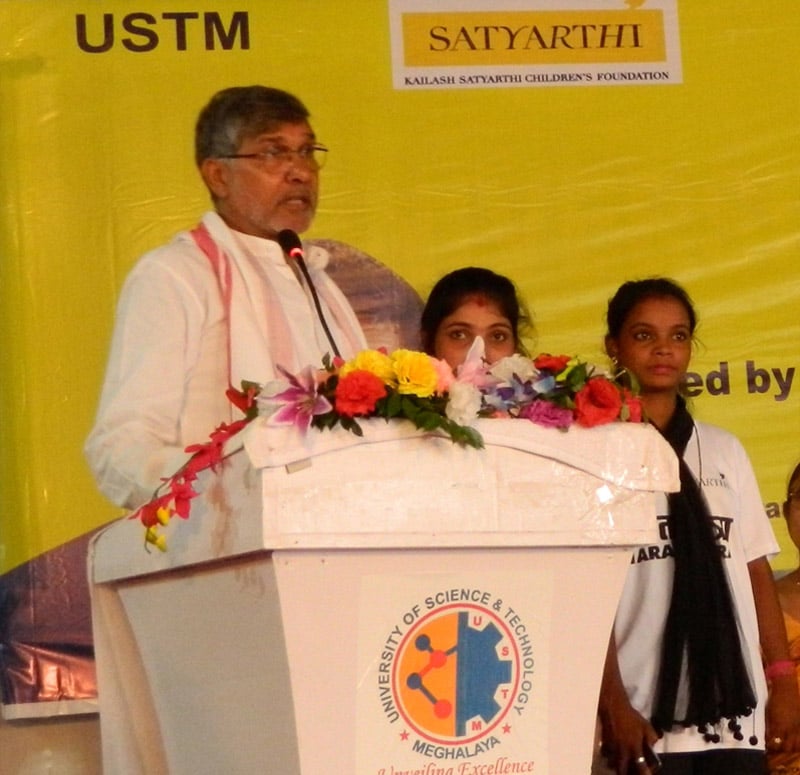 Nobel lautreate Kailash Satyarthi addressing students of the USTM
Nobel lautreate Kailash Satyarthi addressing students of the USTM
“I used to earn about 8-10 crores annually from the Manipal Study Centre since; it was doing really well. However, instead of spending the money on frivolous things for personal gratification, I used that to buy land,” Hoque says.
His foresight in acquiring land has proven to be visionary, ensuring that he always had the necessary space whenever he decided to establish a new institution.
After much struggle, he managed to acquire a 400-acre hillock, featuring a picturesque landscape amid lush greenery in the Baridua area of 9th Mile in Ri-Bhoi district, Meghalaya. This is where the University of Science and Technology Meghalaya (USTM), stands today.
Despite initial skepticism from government officials due to its distance from settlements, Hoque believed the rustic picturesque location would be wonderful for an academic environment. Now, it has evolved into a thriving small city, attracting visitors from far and wide for various reasons.
His commitment to fostering research, innovation, entrepreneurship, and development led to the establishment of the first State Private University in Northeast India called the University of Science & Technology, Meghalaya (USTM). It’s an "A" Graded University, by the NAAC located at Ri-Bhoi, in the state of Meghalaya.
With over 9000 students 57% girls, 80% students from rural areas, and 20% benefitting from free or concessional education. It’s particularly wonderful to see unity in diversity in his institution with 30 plus community and tribe students from across the Northeast, of different religions, and a dedicated team of 1000+ staff.
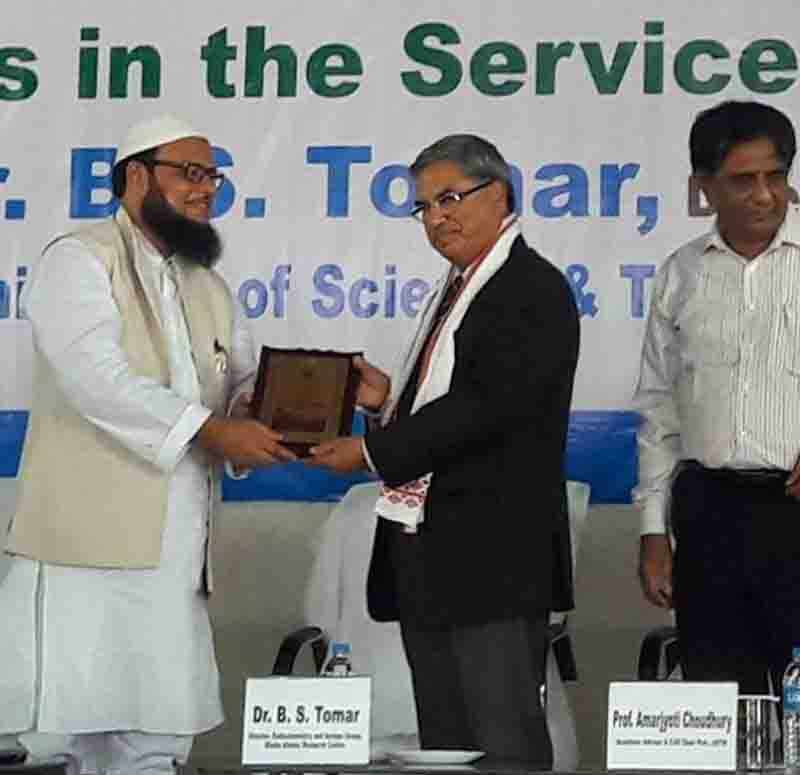 Chancellor Hahbubul Hoque with Dr B S Tomar, Chairman, BARC
Chancellor Hahbubul Hoque with Dr B S Tomar, Chairman, BARCThe USTM stands out with its distinctive "Pay Back Policy." Unprecedented among universities, this policy ensures students receive a full refund of their course fee upon clearing national and state-level exams like NET, GATE, SLET, and Civil Services.
Beyond financial initiatives, USTM actively engages with its community, providing free education to children within a 30 km radius through neighbourhood outreach activities. Each department adopts a village near the campus.
Two Central Public Schools in the Karimganj district have contributed significantly to the betterment of primary and secondary education in the region. Houqe intends to write a new chapter in women’s education, Khairun Nessa Begum Women’s College, named after his mother, came into existence in 2015 in Badarpur.
USTM has forged over 250 partnerships with national and international institutions, industries, NGOs, and R&D organizations. Under its leadership, USTM has earned prestigious awards, including the "Green Assam Award" from the Anti-Global Warming Society Morigaon on June 30, 2022, and the "Best Private University of North East India" title at the Education Eminence 2022 Award on May 30. Recently, on August 21, USTM received UNESCO's "Community Excellence Award" for its efforts in promoting peace, brotherhood, and inclusiveness among indigenous communities in the northeastern region through extension services and free education for underprivileged students.
ALSO READ: Anjuman-e-Islam was the first Indian institution to offer mid-day meal to students
Mahbubul Hoque has built so many institutions and continues doing so has no personal ambitions, but an unbounded desire to see the poor and marginalized doing well educationally changing the educational landscape of the North East.
